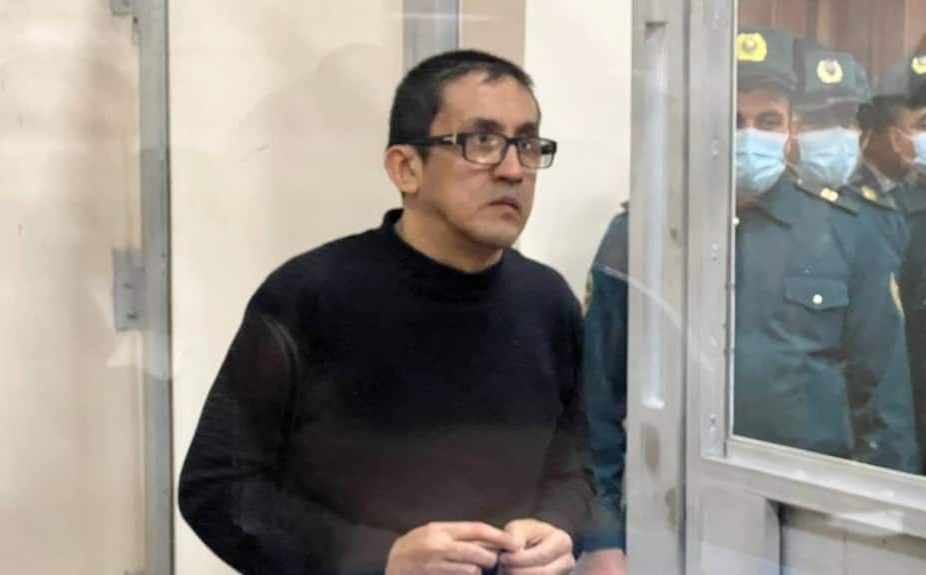Karakalpakstan political prisoners on trial in Uzbekistan
The most representative of the 16 accused is the journalist and lawyer Dauletmurat Tažimuratov, over whom hangs the most serious charge, 'attempt to overthrow the constitutional order'. Last year, thousands of people had taken to the streets against the constitutional amendments of the government in Tashkent that intended to cancel the autonomy status of the region.
Tashkent (AsiaNews) - Uzbekistan's Supreme Court has begun the appeal trial of activists from the Karakalpakstan region, convicted in first instance for last year's Nukus riots. The most representative of the 16 accused is the journalist and lawyer Dauletmurat Tažimuratov, on whom the most serious charge, 'attempt to overthrow the constitutional order', hangs, together with the charges of 'organising mass unrest' and 'conspiracy for the purpose of usurping power', while he himself accused of being subjected to torture in solitary confinement.
The lawyer of the Karakalpakstani activists, Sergej Majorov, spoke about Tažimuratov's condition during the trial, which was also attended by a number of Western diplomats as observers, including the EU representative in Uzbekistan, Lithuania's Mindaugas Kačerauskis.
Instead, the government in Tashkent denied access to the Kazakh humanitarian activist Galym Ageleuov, but the session was nevertheless broadcast on YouTube by Gazeta.uz, showing all the participants' speeches.
Majorov confesses that he is 'not optimistic', although he hopes that the judges will allow everyone to speak. In his opinion, there is too much prejudice and pressure on Tažimuratov, former editor-in-chief in Nukus of the Karakalpakstana-language newspaper El kyzmetinde, from where he spoke out against Uzbekistan's constitutional amendments, which were intended to exclude the region's autonomous status, and urged local citizens to take to the streets for 'peaceful demonstrations'.
Thousands of people joined this call at the end of June 2022, but the protest was suppressed in a very violent manner, resulting in 21 deaths (including four policemen) and over 270 injuries. In the end, the presidency gave up on changing the autonomous status of Karakalpakstan.
The activists were arrested on 1 July and held incommunicado first in Nukus, then in Bukhara. Tažimuratov remained locked up under the harshest regime, especially in the run-up to the first-instance trial, when he was transferred to a rigorous cell in Zangiat, near Tashkent. At the opening of the trial on 15 May, following allegations of torture, the court ordered an investigation, the conclusions of which officially stated that 'no evidence of acts of pressure or humiliation of the accused was found'.
According to the lawyer, Dauletmurat showed no signs of violence at the beginning of the trial, but complained of severe pain in his kidneys, recounting how in solitary confinement he was forced to shower first under a jet of boiling water, which immediately afterwards turned icy cold, in his opinion with the aim of weakening him. However, the lawyer managed to visit him twice during the period of solitary confinement, the second time also with his brother Renat, who was then allowed to see him regularly.
Tažimuratov was charged not only with subversive actions, but also with 'embezzlement' and 'money laundering'. To a large extent, according to Majorov, these charges are based on linguistic misunderstandings regarding the accounting documents of the activities of all the convicts, more than 300 pages in the Karakalpakstana language, very different from both Uzbek and Russian.
For the lawyer, 'it is clear that Dauletmurat has always been inconvenient for the authorities in Tashkent, because he called a spade a spade, recounting the republic's many unresolved problems, criticising the bureaucracy and the country's political leadership', even through his own blog on the internet. Many of the accusations gather episodes and expressions from the last two to three years.
The most serious accusations, those against the constitution and the attempted coup, which are rather contradictory to each other, were made by the 'K. Suleymanov', later confirmed and extended directly by the national security services.
These investigations appear decidedly biased, without giving the defence the opportunity to see all the elements of the conclusions. The 'plot' to seize power, which presupposes a vast network of conspirators, is attributed to Tažimuratov alone, with only the complicity of another person, Logalul Kallykhanova, actually convicted of other crimes.
President Mirziyoyev and the government in Tashkent are trying to keep their distance from the court and the controversy, when in fact, according to the accused, they are the ones who are really responsible for the problems of the region, the largest in the whole of Uzbekistan, whose future destiny remains in the balance.
12/02/2016 15:14







.png)










